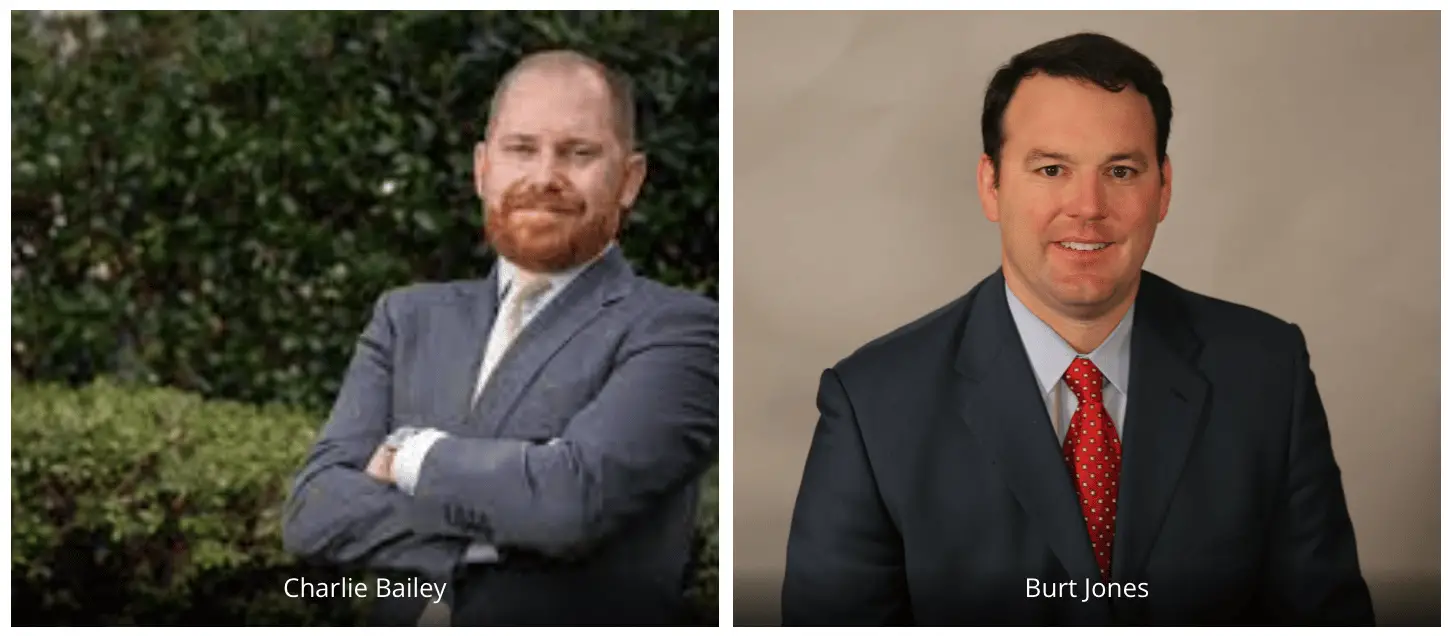State Sen. Burt Jones was among 16 Republicans who participated as alternate electors in a bid to help then-President Donald Trump overturn the results of the 2020 presidential election in Georgia.
While Jones’ role in those efforts took place almost two years ago, the episode is front and center in this year’s race for lieutenant governor between Jones and Democrat Charlie Bailey.
“You can’t have a more un-American act than to come in and say the people of Georgia don’t get to decide who represents them,” said Bailey, who made the ill-fated attempt to change the outcome of the election a theme of a campaign ad.
Jones dismisses the assembling of a slate of alternate electors in December 2020 as a “procedural” move, essentially a place saver prompted by a series of ultimately unsuccessful lawsuits challenging the election results in Georgia.
“The substitute electors were only going to have any weight to them if the court cases moved forward,” he said. “As I go around the state, rank and file Georgians aren’t asking about it.”
Trump’s attempt to enlist supporters in his attempt to overturn the election in Georgia is responsible for who’s on the ballot for lieutenant governor. Incumbent Lt. Gov. Geoff Duncan, who became the most outspoken Republican critic of Trump’s Georgia strategy, subsequently opted not to seek a second term.
That paved the way for a spirited GOP primary for the open seat, with Jones defeating Georgia Senate President Pro Tempore Butch Miller and two other opponents last May to win the Republican nomination.
Bailey, originally intending to reprise his 2018 run for attorney general, signed up instead to run for lieutenant governor. With a crowded Democratic field in the primary contest, he had to survive a June runoff to capture his party’s nomination over former Atlanta City Councilman Kwanza Hall.
While Jones’ role in the aftermath of the presidential election is a unique element in the race for lieutenant governor, the two candidates are taking the typical stances of their respective parties on issues including taxing and spending, abortion, guns, voting rights, and Medicaid expansion.
Jones goes further than some Republican leaders in his call for eliminating the state income tax. Georgia House Speaker David Ralston, R-Blue Ridge, and others expressed concern that getting rid of the tax entirely would blow a hole in the state budget.
Jones noted the General Assembly already is well on its way toward phasing out the tax. This year, lawmakers passed a bill backed by Gov. Brian Kemp that will gradually reduce the state income tax rate from 5.49% to 4.99% over six years, starting with the 2024 tax year.
“I never said you could do it in one year,” Jones said. “We need to work toward it.”
Bailey said 20 years of Republican leadership in Georgia have led to a reduction in core government services. Examples include a starting salary for teachers that’s less than their peers make in Mississippi and a growing backlog in forensics testing that hampers criminal investigations, he said.
“I don’t think the people of Georgia are getting out of their tax dollars what they’re putting in,” Bailey said.
On abortion, Jones said he supports the “heartbeat” bill the legislature passed in 2019 banning the procedure after a fetal heartbeat has been detected, typically about six weeks into pregnancy.
“It has exceptions to it: rape, incest, and the health of a woman,” Jones said.
Bailey said if elected he would push to repeal the heartbeat law, pointing to public opposition to banning abortion that has surfaced in recent polls.
“That’s not what the people of Georgia believe,” he said. “It’s dangerous.”
Likewise, Bailey opposes legislation the Republican-controlled General Assembly passed this year allowing Georgians to carry concealed firearms without a permit.
“There’s dangerous folks who have guns now who wouldn’t but for this law,” he said. “It makes our communities less safe.”
Jones, who voted for the bill, said criminals are going to carry firearms regardless of what the law says.
“[The law] makes it easier for law-abiding citizens to protect themselves,” he said.
The two candidates also disagree on election reform legislation the General Assembly passed last year.
Jones bristled at the bill being characterized as putting additional “restrictions” on voting by absentee ballot. He said “verification” was the purpose of the law.
The legislation requires a photo ID to cast an absentee ballot and limits the number of ballot boxes counties may place to collect absentee ballots.
“We wanted to verify that people asking for absentee ballots were these people,” Jones said.
Bailey described the new law as “a solution in search of a problem” that doesn’t exist.
“We don’t have voting issues in Georgia,” he said. “[Republicans] have put government in the way of the people and their right to exercise the franchise.”
Bailey said it’s past time for Georgia to expand Medicaid through the Affordable Care Act a Democratic Congress passed in 2010. Not to do so simply means Georgians through their federal taxes are helping fund expanded health-care coverage in other states while getting nothing in return.
“Not only do we have 600,000 Georgians without health insurance …. we’ve had eight rural hospitals close in the last 12 years,” Bailey said.
Jones said Kemp has sought to expand Medicaid coverage with a Georgia-centric plan but was turned down by the Biden administration. The governor has rejected the Obamacare version of Medicaid expansion as too expensive.
“Just throwing money at something without a plan isn’t helpful,” Jones said. “That’s what the Democrats want to do.”
The two candidates broadly agree on the need to boost funding for education by updating the decades-old per-pupil student funding formula and the need to raise salaries for law enforcement officers.
Specifically, Jones called for an end to no-cost bail. Bailey said Georgia needs more prosecutors, judges, and public defenders.
Libertarian Ryan Graham is a third candidate in the race for lieutenant governor.
This story is available through a news partnership with Capitol Beat News Service, a project of the Georgia Press Educational Foundation.
Disclosure: This article may contain affiliate links, meaning we could earn a commission if you make a purchase through these links.






